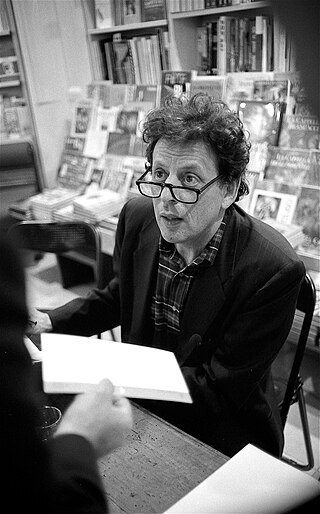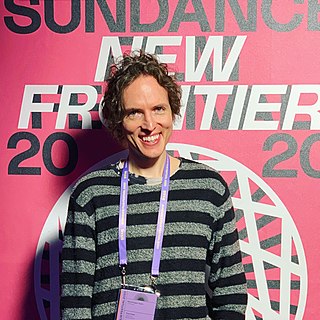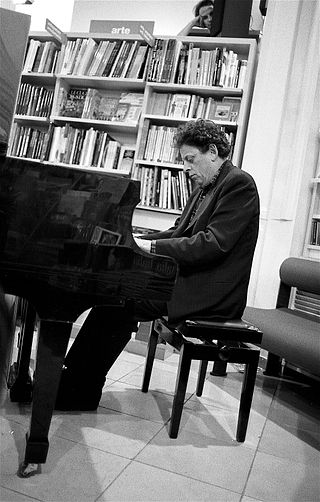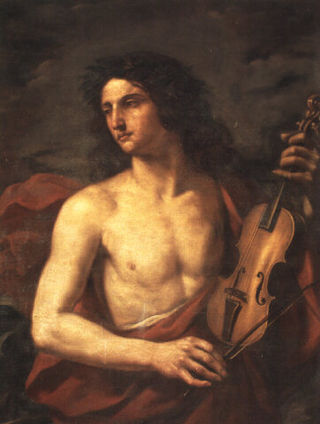
Philip Glass is an American composer and pianist. He is widely regarded as one of the most influential composers of the late 20th century. Glass's work has been associated with minimalism, being built up from repetitive phrases and shifting layers. Glass describes himself as a composer of "music with repetitive structures", which he has helped to evolve stylistically.
A concerto is, from the late Baroque era, mostly understood as an instrumental composition, written for one or more soloists accompanied by an orchestra or other ensemble. The typical three-movement structure, a slow movement preceded and followed by fast movements, became a standard from the early 18th century.
The Warsaw Concerto is a short work for piano and orchestra by Richard Addinsell, written for the 1941 British film Dangerous Moonlight, which is about the Polish struggle against the 1939 invasion by Nazi Germany. In performance it normally lasts just under ten minutes. The concerto is an example of programme music, representing both the struggle for Warsaw and the romance of the leading characters in the film. It became very popular in Britain during World War II.

Dennis Russell Davies is an American conductor and pianist. He is currently the music director and chief conductor of the Brno Philharmonic.
Paul Zukofsky was an American violinist and conductor known for his work in the field of contemporary classical music.
Jenny Lin is a Taiwanese-born American pianist.

Tim Fain is an American violinist and composer, best known for his performances in the feature film soundtracks to Black Swan, 12 Years a Slave, and Moonlight, and his work with American composer Philip Glass.
Philip Bračanin is an Australian composer and musicologist.
Philip Glass' Violin Concerto No. 2, titled The American Four Seasons, received its world premiere in Toronto on December 9, 2009, with violinist Robert McDuffie, for whom the work was composed, and the Toronto Symphony Orchestra under conductor Peter Oundjian. Its European premiere was in London on April 17, 2010, with McDuffie and the London Philharmonic Orchestra under conductor Marin Alsop.

The Cello Concerto No. 1 was written by Philip Glass in 2001. It was one of the first concerti of the twenty-first century. The piece was commissioned by William and Rebecca Krueger, friends of both the cellist Julian Lloyd Webber and the conductor Yu Long in celebration of Lloyd Webber's 50th birthday and the first anniversary of Maestro Yu's China Philharmonic Orchestra. The work was premiered by Lloyd Webber with Long Yu conducting the China Philharmonic during the 2001 Beijing Music Festival, and attracted significant attention as the first time the work of a major western composer had its world premier in China. A typical performance takes about 30 minutes. The work is paired with the Concerto Fantasy for Two Timpanists and Orchestra as part of Glass' Concerto Project, a series of collected concerti by the composer. The cello concerto is among the most famous of Glass' works for a solo instrument.

The Truman Show: Music from the Motion Picture is a soundtrack to the 1998 film of the same name and was composed by Burkhard Dallwitz. Dallwitz was hired after Peter Weir received a tape of his work while in Australia for the post-production. Some parts of the soundtrack were composed by Philip Glass, including four pieces which appeared in his previous works. Glass also appears very briefly in the film as one of the in-studio composer / performers. Glass and Dallwitz won a Golden Globe for Best Original Score.

The Concerto Project is a collection of concerti written by Philip Glass. The series was begun in 2000 and contains eight works, the most famous of which is probably the Concerto for Cello and Orchestra. Some of the concerti in the volumes were written before the commencement of the project and were categorized into the series.
The Concerto Fantasy for Two Timpanists and Orchestra is a double timpani concerto written by Philip Glass in 2000. It is paired with the Cello Concerto on Vol. I of Glass' Concerto Project, a set of eight concerti by the composer. A typical performance of the work lasts 25–28 minutes. It was written for Jonathan Haas and later recorded by Evelyn Glennie, and was premiered by Haas and Svet Stoyanov with the American Symphony Orchestra in Avery Fisher Hall, Lincoln Center, conducted by Leon Botstein. The work was commissioned jointly by the American Symphony Orchestra, the Peabody Symphony, the Milwaukee Symphony, the St. Louis Symphony and the Phoenix Symphony. In 2004, a transcription for wind ensemble was written by Mark Lortz, which debuted at Peabody Institute in 2005.
The Tirol Concerto for Piano and Orchestra is a piano concerto by Philip Glass. The composer wrote the work in 2000. On commission by the Klangspuren in Stuttgart, it was written for the Stuttgarter Kammerorchester. It is one of eight concerti in Glass' series The Concerto Project, an amalgamation of works in four volumes.

The Piano Concerto No. 2 was written by American composer Philip Glass in 2004. It is also called the Piano Concerto No. 2: After Lewis and Clark, due to its musical representation of the American pioneers. It was composed for the Nebraska Lewis and Clark Bicentennial Commission, the Lied Center for Performing Arts, and the University of Nebraska-Lincoln Hixson–Lied College of Fine and Performing Arts. It is included as one of the concerti in Glass' Concerto Project, a four-volume collection of commissioned works. The work itself deals with the journey of Meriwether Lewis and William Clark, interpreting the stages of their expedition progressively in each movement.

The Concerto for Harpsichord and Orchestra was completed by Philip Glass in spring of 2002. It was commissioned for the Northwest Chamber Orchestra by Charles and Diana Carey and published by Dunvagen Music. Glass wrote the concerto with the Baroque tradition in mind; however, in order to approach the work in a modern idiom, he calls for a contemporary chamber orchestra to accompany the harpsichord. The concerto was premiered in September 2002 in Seattle, with David Schrader as soloist performing with the Northwest Chamber Orchestra. It is approximately 20 minutes in length. The concerto was included in Glass' Concerto Project, a collection in four volumes.

Víkingur Ólafsson is an Icelandic pianist.
Jonathan Haas is an American timpanist. Philip Glass' Concerto Fantasy for Two Timpanists and Orchestra was commissioned for him by several orchestras.

Orphée is a chamber opera in two acts and 18 scenes, for ensemble and soloists, composed in 1991 by Philip Glass, to a libretto by the composer, based on the scenario of the eponymous film (1950) by Jean Cocteau. Commissioned by the American Repertory Theater in Cambridge, Massachusetts, and the Brooklyn Academy of Music in New York, this is the first part of a trilogy in honour of the French poet. The world premiere of the work took place on 14 May 1993 under the direction of Martin Goldray and the European premiere in London on 27 May 2005 in the Royal Opera House's Linbury Studio Theatre.







